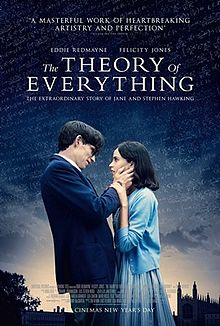Reviewer: ‘The Theory of Everything’ tells a real story
Film offers unique look at Hawking’s personal life
4 out of 5 stars
I went into the theatre knowing very little about ‘The Theory of Everything’ when I saw it this weekend. I was under the impression that the movie was primarily about Stephen Hawking’s life and the relationship he had with his wife, Jane Hawking.
Otherwise, I had very few preconceptions about the plot or premise of the film. I left the theatre with a better insight into Hawking’s life but I also initially found myself at a loss for their choice to focus the plot heavily on his relationship with Jane.
The movie gets its title from Hawking’s search for a singular unifying equation of everything in the universe, a literal ‘theory of everything.’ This is the theory that Hawking was pursuing eagerly during his years as a young graduate student.
While he never ultimately finds such an equation, his astronomical work is heavily portrayed in the film which begins while Hawking is pursuing his PhD from Cambridge.
The biggest takeaway from the production is definitely Eddie Redmayne’s performance. He captures Hawking’s biting intelligence and quirks early in his life but also captivates the audience with his adept ability to portray Hawking’s degrading health during the advancement of his disease, Amyotrophic lateral sclerosis (ALS).
His performance initially begins with small signs, such as clumsy chalk handling or stumbling while walking across campus, but slowly advances to more serious symptoms to the point where Redmayne is left unable to move and finds himself constrained to a chair, in line with Stephen Hawking’s current condition.
This portrayal was enchanting as it provided a rare opportunity to see life at various stages of such a debilitating disease. It provides the audience with an insight to a Stephen Hawking we’ve never had the chance of meeting.
Through the film, we are reminded that despite declining mobility, Hawking gets married, has three children, completes his PhD, and even authors books.
While I very much enjoyed getting to learn more about Hawking’s personal life from a film he deems “broadly true” (Variety.com), I questioned the directors choice to focus the movie on his relationship with Jane.
At the end of the day, his relationship with Jane was not particularly romantic. They married, struggled immensely, and eventually divorced. While this is not surprising considering the struggles involved in coping with a disabled partner, I found it odd that a film was made to portray it.
The marketing materials implied a love story or romance of some cinema worthy nature. It advertised a love story we see in fairy tales, and this was not the case with their real lives and there was no fairy tale love in the film.
That being said, in some ways I really appreciated the relationship as it was portrayed in the film. Their love was refreshing in the sense that it wasn’t romanticized or elevated to an unrealistic level, as is often the case in silver screen love stories. It was an honest love.
Additionally, a close look at the life he lead with Jane may be the best way to portray Hawking’s personal life. While many of us know him for his great achievements in the scientific community, or his published works such as A Brief History of Time or The Grand Design, very few people truly have access to his personal side.
Through Jane Hawking’s memoir, and this film based off of that work, we see the side of this scientist we may have otherwise lost.







